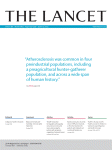Lancet:不同NSAID对血管影响存在差异
2013-06-08 姜珊 编译 中国医学论坛报
英国一项研究表明,大剂量双氯芬酸和布洛芬的血管性风险与昔布类药物相似;与其他非类固醇类抗炎药(NSAID)相比,大剂量萘普生血管性风险较小。该论文5月30日在线发表于《柳叶刀》(Lancet)杂志。 该荟萃分析纳入包括超过35万例患者的754项比较NSAID与安慰剂或两种不同NSAID的研究。结果为,昔布类[率比(RR)=1.37]或双氯芬酸(RR=1.41)使主要血管事件增加约1/3。
英国一项研究表明,大剂量双氯芬酸和布洛芬的血管性风险与昔布类药物相似;与其他非类固醇类抗炎药(NSAID)相比,大剂量萘普生血管性风险较小。该论文5月30日在线发表于《柳叶刀》(Lancet)杂志。
该荟萃分析纳入包括超过35万例患者的754项比较NSAID与安慰剂或两种不同NSAID的研究。结果为,昔布类[率比(RR)=1.37]或双氯芬酸(RR=1.41)使主要血管事件增加约1/3。布洛芬显著增加主要冠脉事件(RR=2.22),不增加主要血管事件。萘普生不显著增加主要血管事件。对于血管性死亡,昔布类(RR=1.58)和双氯芬酸(RR=1.65)使其显著增加,布洛芬所致增加无统计学显著性,萘普生不增加该风险。所有NSAID均约使心力衰竭风险翻倍,且所有NSAID治疗方案均增加上消化道并发症发生风险。

Vascular and upper gastrointestinal effects of non-steroidal anti-inflammatory drugs: meta-analyses of individual participant data from randomised trials
Background
The vascular and gastrointestinal effects of non-steroidal anti-inflammatory drugs (NSAIDs), including selective COX-2 inhibitors (coxibs) and traditional non-steroidal anti-inflammatory drugs (tNSAIDs), are not well characterised, particularly in patients at increased risk of vascular disease. We aimed to provide such information through meta-analyses of randomised trials.
Methods
We undertook meta-analyses of 280 trials of NSAIDs versus placebo (124 513 participants, 68 342 person-years) and 474 trials of one NSAID versus another NSAID (229 296 participants, 165 456 person-years). The main outcomes were major vascular events (non-fatal myocardial infarction, non-fatal stroke, or vascular death); major coronary events (non-fatal myocardial infarction or coronary death); stroke; mortality; heart failure; and upper gastrointestinal complications (perforation, obstruction, or bleed).
Findings
Major vascular events were increased by about a third by a coxib (rate ratio [RR] 1·37, 95% CI 1·14—1·66; p=0·0009) or diclofenac (1·41, 1·12—1·78; p=0·0036), chiefly due to an increase in major coronary events (coxibs 1·76, 1·31—2·37; p=0·0001; diclofenac 1·70, 1·19—2·41; p=0·0032). Ibuprofen also significantly increased major coronary events (2·22, 1·10—4·48; p=0·0253), but not major vascular events (1·44, 0·89—2·33). Compared with placebo, of 1000 patients allocated to a coxib or diclofenac for a year, three more had major vascular events, one of which was fatal. Naproxen did not significantly increase major vascular events (0·93, 0·69—1·27). Vascular death was increased significantly by coxibs (1·58, 99% CI 1·00—2·49; p=0·0103) and diclofenac (1·65, 0·95—2·85, p=0·0187), non-significantly by ibuprofen (1·90, 0·56—6·41; p=0·17), but not by naproxen (1·08, 0·48—2·47, p=0·80). The proportional effects on major vascular events were independent of baseline characteristics, including vascular risk. Heart failure risk was roughly doubled by all NSAIDs. All NSAID regimens increased upper gastrointestinal complications (coxibs 1·81, 1·17—2·81, p=0·0070; diclofenac 1·89, 1·16—3·09, p=0·0106; ibuprofen 3·97, 2·22—7·10, p<0·0001; and naproxen 4·22, 2·71—6·56, p<0·0001).
Interpretation
The vascular risks of high-dose diclofenac, and possibly ibuprofen, are comparable to coxibs, whereas high-dose naproxen is associated with less vascular risk than other NSAIDs. Although NSAIDs increase vascular and gastrointestinal risks, the size of these risks can be predicted, which could help guide clinical decision making.
本网站所有内容来源注明为“梅斯医学”或“MedSci原创”的文字、图片和音视频资料,版权均属于梅斯医学所有。非经授权,任何媒体、网站或个人不得转载,授权转载时须注明来源为“梅斯医学”。其它来源的文章系转载文章,或“梅斯号”自媒体发布的文章,仅系出于传递更多信息之目的,本站仅负责审核内容合规,其内容不代表本站立场,本站不负责内容的准确性和版权。如果存在侵权、或不希望被转载的媒体或个人可与我们联系,我们将立即进行删除处理。
在此留言










#SAID#
113
#AID#
0
#Lancet#
60
#NSAID#
100